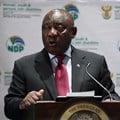The World Economic Forum's Davos 2023 kicks off today against the most complicated political and economic backdrop in decades.

Source: Reuters. A general view shows Davos Congress Centre, the venue of the World Economic Forum (WEF) 2023, in the Alpine resort of Davos, Switzerland, January 14, 2023.
The World Economic Forum (WEF) Annual Meeting 2023 takes place from 16-20 January in Davos, Switzerland, and comes as multiple crises deepen divisions that will fragment the geopolitical landscape.
Børge Brende, president of the WEF, reiterated in a public statement that we need to avoid another global recession and a repeat of the 1970s, which was characterised by low growth and high inflation that lead to high unemployment rates.
"We are unfortunately expecting that some countries will go into a recession. We hope that the big economies will pull things together, will not go into recession and can carry the global economy forward."
"We need to recreate global growth; we have to create jobs and it has to be inclusive," he said. "We have to continue to trade with each other; to invest with each other."
Themed 'Cooperation in a Fragmented World', Davos 2023 - Brende said - is aiming to bring people together at a time of global fragmentation. We can see the world is between orders - we don't know what is coming.
"Wars and conflicts make it less likely that we can solve the global challenges. We need to come together and find areas where we can cooperate even in a world with competition."
The who's who in attendance
"We have all the right people in Davos to really try to find solutions in the fragmented world," Brende said.
Davos 2023 is hosting 1,700 leading business people and almost 400 public figures, ministers, head of states and civil society. There are more than 400 official sessions.
This year, Davos represents a huge Asian footprint.
"We welcome a high-level delegation from China - a lot of Chinese businesses are coming. We have all the key Japanese companies coming. We have the Korean president and a huge business delegation from Korea, as well as key leaders from the Philippines, Vietnam, Singapore, Malaysia and Indonesia.
"Many people would say this is Asia-centric..."
This is in stark contrast to Davos 2022 in May last year.
Climate change in focus
"Global challenges need global solutions, not only when it comes to economic growth, but also on biodiversity and the climate," Brende said. "At the same time, we do see some cooperation again taking place. It was a major breakthrough when the US and China decided at COP27 meeting to restart the cooperation on climate change," Brende continued.
"I think there is hope also that with the lifting of Covid restrictions now in China, that we will see a more global growth coming at the end of this year and in 2024. But this also very much depends on the possibility to start to trade and invest.
"I'm optimistic that Davos can play a positive role in bringing countries and companies together, realising that we can only achieve things if we collaborate and stick together."
Nqobile Dludla 16 Jan 2023
Of all the sessions at Davos, Brende said he was most looking forward to the meeting of the First Movers Coalition - a public-private partnership to commercialise clean technologies through advance purchase commitments.
Launched by President Biden in partnership with the World Economic Forum at COP26, the First Movers Coalition has expanded to include 65 companies, representing more than 10% of the global Fortune 2000 by market value, as well as 10 government partners. New corporate members include General Motors, PepsiCo, and Rio Tinto.
Public-private partnerships
The coalition has launched an unprecedented set of new commitments focused on cement and concrete – in which companies will purchase at least 10% near-zero carbon cement and concrete by 2030 – anchored by world-leading companies such as General Motors.
"One thing that is very meaningful for me is when business and governments can come together, and move some very important topics. [The coalition] has decided that it will use its purchasing power to grow their supply chain.
"That means the Amazons, the Apples of the world will only buy, for example, aluminium from those that deliver aluminium of which at least 20% has to be green, or that they will only purchase fertilisers produced by green energy. They will use the same purchasing power when it comes to air travel or a whole new transport of goods on the sea."
In total, First Movers Coalition corporate members have pledged $12bn, the world’s strongest demand signal, for bringing emerging innovations to scale.
These commitments will drive investment in next-generation clean steel, aluminium, and cement; near-zero carbon aviation fuels; zero-emission trucking and shipping; and carbon dioxide removal.
"This, for me, is really at the core of what the Davos forum is critically doing: is encouraging public-private co-operation, making sure that this can benefit the whole world," Brende concluded.



































